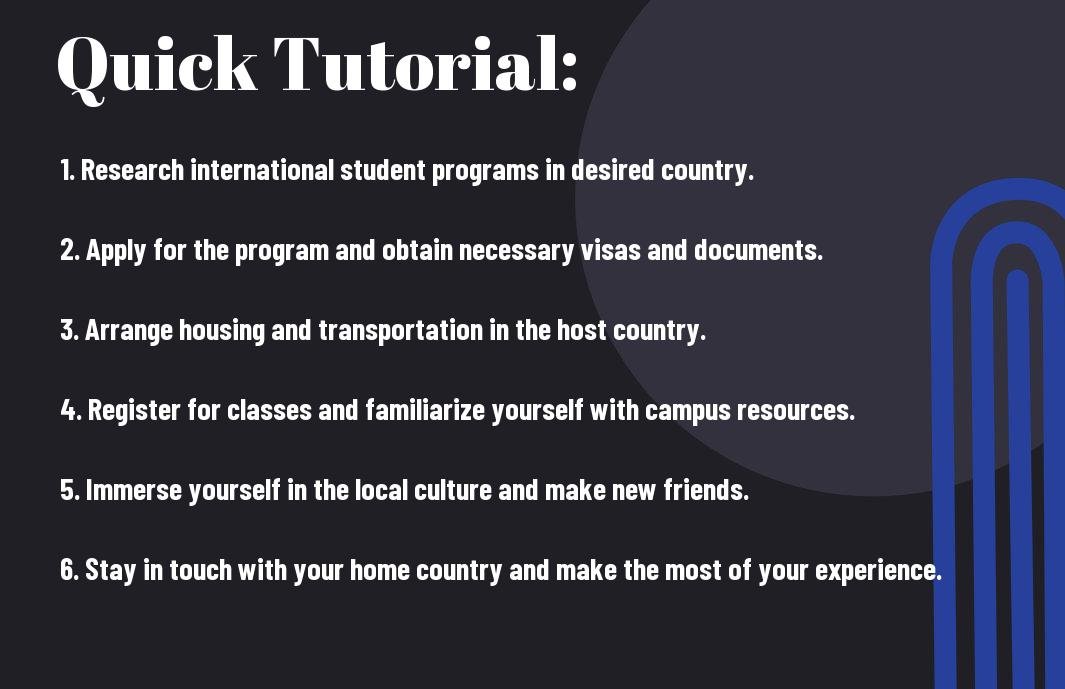How Do Foreign Exchange Students Work – Navigating International Student Programs
- Home
- How Do Foreign Exchange Students Work – Navigating International Student Programs

How Do Foreign Exchange Students Work – Navigating International Student Programs
Embarking on the journey of being a foreign exchange student can be both exciting and challenging. Navigating international student programs require careful planning and consideration to ensure a smooth and successful experience. In this blog post, I will provide you with a comprehensive guide on how foreign exchange student programs work, including important details such as student visa requirements, cultural adjustments, and academic expectations. Whether you are a student looking to study abroad or a host family considering hosting an exchange student, this post will help you navigate the ins and outs of international student programs.
Key Takeaways:
- Exchange Programs Are Valuable Opportunities: Foreign exchange programs provide students with invaluable opportunities for cultural exchange, language immersion, and personal growth.
- Visa and Legal Requirements: Navigating the visa and legal requirements for foreign exchange students can be complex and require careful planning and attention to detail.
- Academic and Social Support: International student programs often provide academic and social support to help students adjust to the new environment and succeed in their studies.
- Cultural Adjustment: Foreign exchange students may experience culture shock and require support to navigate and adjust to the new cultural norms and expectations.
- Immersive Learning Experience: Exchange programs offer a unique and immersive learning experience that can greatly enhance a student’s global perspective and future career opportunities.
Understanding Foreign Exchange Student Programs
As a foreign exchange student, navigating international student programs can be both exciting and overwhelming. Understanding the different types of international student programs available is essential for finding the right fit for your educational and cultural goals.
Types of International Student Programs
Foreign exchange student programs come in various forms, each offering unique opportunities for cultural exchange and academic enrichment. Some of the most common types of international student programs include study abroad programs, exchange programs, language immersion programs, cultural exchange programs, and work and travel programs. Each of these programs has its own set of requirements, benefits, and experiences to offer.
| 1. Study Abroad Programs | Opportunity to study in a foreign country for a semester or academic year |
| 2. Exchange Programs | Allows students to attend a partner institution in another country |
| 3. Language Immersion Programs | Immerses students in the language and culture of a specific country |
| 4. Cultural Exchange Programs | Focuses on cultural exchange and understanding between students from different countries |
| 5. Work and Travel Programs | Combines work and travel opportunities in a foreign country |
Perceiving the differences between these programs is crucial in choosing the one that aligns with your personal and academic goals.
Benefits of Foreign Exchange Programs
Participating in a foreign exchange program offers a multitude of benefits, including enhancing cross-cultural communication skills, gaining a new perspective on global issues, improving language proficiency, and building a global network of friends and contacts. Additionally, the experience of living and studying in a different country can foster personal growth and increase self-confidence as you navigate unfamiliar environments and cultural norms.
Navigating the Application Process
Some of the most important aspects of becoming a foreign exchange student are understanding and navigating the application process. This process can differ depending on the international student program you choose, but there are some general steps that you will likely need to follow.
Finding and Applying to Host Schools
When applying to become a foreign exchange student, one of the first steps is finding and applying to host schools. Researching and selecting potential schools can be a daunting task, but it is important to find a good fit for your academic and personal needs. Once you have narrowed down your choices, you will need to complete the application process for each school, which may include submitting transcripts, letters of recommendation, and personal statements. It’s essential to pay close attention to deadlines and requirements for each school to ensure you submit a strong application.
Understanding Visa and Immigration Processes
Understanding the visa and immigration processes is crucial for foreign exchange students. Depending on the program and the country you will be studying in, you may need to apply for a student visa or residence permit. It’s important to familiarize yourself with the specific requirements and procedures for obtaining the necessary documentation. This process can be complex and time-consuming, so it’s important to start early and stay organized. Additionally, immigration regulations can change, so it’s important to stay informed and seek guidance from your program advisor or an immigration attorney if needed.
By understanding and navigating the application process, you can set yourself up for a successful foreign exchange student experience. From finding and applying to host schools to understanding visa and immigration processes, being thorough and proactive in your approach will ensure a smoother transition to studying abroad. Remember, the more effort you put into this process, the more rewarding your experience as a foreign exchange student will be. Be proactive and pay close attention to deadlines and requirements, and seek guidance from reliable sources if needed.
Preparing for the Foreign Exchange Experience
To ensure a successful and enriching foreign exchange experience, preparation is key. From understanding cultural differences to improving language skills, taking the time to prepare will help you make the most of your international student program.
Cultural Differences and Sensitivity
When preparing for a foreign exchange experience, it’s crucial to familiarize yourself with the cultural norms and customs of the host country. This includes being aware of social etiquette, communication styles, and traditions. It’s important to approach cultural differences with sensitivity and an open mind, as what may be acceptable in your home country could be perceived quite differently abroad. Take the time to learn about the host country’s history, values, and taboos to avoid unintentionally causing offense.
Language Preparation and Communication
Another important aspect of preparing for a foreign exchange experience is enhancing your language skills. Whether you’re studying in an English-speaking country or immersing yourself in a non-English speaking environment, improving your language proficiency will greatly enhance your ability to communicate and connect with others. Consider taking language classes, practicing with native speakers, and immersing yourself in the language as much as possible before arrival. Additionally, learning basic phrases and expressions in the local language can go a long way in making a positive impression and fostering meaningful connections with your host community.
Support and Resources for Foreign Exchange Students
Unlike domestic students, foreign exchange students often require additional support and resources to help them navigate through their study abroad experience. These resources are crucial in ensuring the success and well-being of international students in their new environment. Here are some of the key support systems and resources available to foreign exchange students.
Academic and Social Support Services
Foreign exchange students have access to a range of academic support services to help them adjust to the new education system and succeed in their studies. These services may include language tutoring, study skills workshops, and academic counseling. Additionally, international student programs often provide social support services such as cultural integration activities, mentorship programs, and counseling services to help students overcome the challenges of adapting to a new social environment.
Tips for Making the Most of the Experience
When embarking on a foreign exchange program, it’s important to make the most of the experience by fully immersing yourself in the new culture and lifestyle. Here are a few tips to help you maximize your experience:
- Stay open-minded and adaptable: Embrace new experiences and cultural differences with an open mind, and be willing to adapt to new ways of living.
- Seek out support networks: Connect with other international students, join clubs and organizations, and build a support network to help you navigate through the challenges of living abroad.
- Take risks and try new things: Step out of your comfort zone and try new activities, foods, and experiences to fully embrace the cultural diversity of your host country.
Perceiving cultural differences as opportunities for personal growth and learning will enrich your study abroad experience and help you develop a global perspective.

Summing up How Do Foreign Exchange Students Work – Navigating International Student Programs
In conclusion, navigating international student programs can be a challenging yet rewarding experience for foreign exchange students. It is essential to be proactive in seeking out opportunities, understanding the cultural differences, and embracing the diverse perspectives that come with studying abroad. As a foreign exchange student, you will need to be flexible, open-minded, and willing to adapt to a new environment. With the right mindset and support system, you can make the most of your international student experience and gain valuable insights that will last a lifetime. Remember, the key to success as a foreign exchange student lies in your willingness to immerse yourself in a different culture and academic system while remaining true to your own identity. Good luck on your journey!
FAQ
Q: What is a foreign exchange student?
A: A foreign exchange student is someone who travels to a different country to live and study as part of an international student program. This allows students to experience a new culture, improve language skills, and gain a deeper understanding of global perspectives.
Q: How do foreign exchange programs work?
A: Foreign exchange programs typically involve a partnership between educational institutions in different countries. Students apply to their home institution’s exchange program, and if accepted, they can spend a semester or academic year studying abroad at a partner institution.
Q: What are the benefits of being a foreign exchange student?
A: Being a foreign exchange student offers numerous benefits, including the opportunity to immerse oneself in a new culture, develop language skills, gain independence, build a global network, and enhance future career prospects by demonstrating cultural awareness and adaptability.
Q: How can international students navigate the challenges of studying abroad?
A: International students can navigate the challenges of studying abroad by researching the host country’s culture and customs, seeking support from their host institution’s international student office, staying open-minded and flexible, and actively participating in cultural activities and events. It’s also important to stay in touch with family and friends for emotional support.
Q: What should foreign exchange students consider when choosing a program?
A: When choosing a foreign exchange program, students should consider factors such as the quality of education at the host institution, the availability of support services for international students, the cost of living in the host country, and the potential for cultural enrichment and personal growth. Additionally, it’s important to consider any language requirements and visa regulations for the host country.
- Share
Mark Twain
Mark Twain stands at the helm of Create More Flow, infusing every sentence with the wisdom of his 15-year expeience through the seas of SEO and content creation. A former BBC Writer, Mark has a knack for weaving simplicity and clarity into a tapestry of engaging narratives. In the realm of content, he is both a guardian and a guide, helping words find their flow and stories find their homes in the hearts of readers. Mark's approach is grounded in the belief that the best content feels like a chat with an old friend: warm, inviting, and always memorable. Let Mark's expertise light up your website with content that's as friendly to Google as it is to your audience. Each word is chosen with care, each sentence crafted with skill - all to give your message the human touch that both readers and search engines love.
